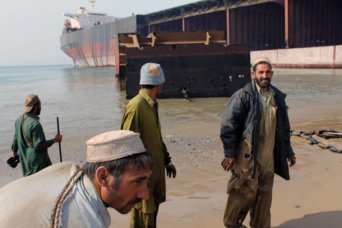- About
- Topics
- Picks
- Audio
- Story
- In-Depth
- Opinion
- News
- Donate
- Signup for our newsletterOur Editors' Best Picks.Send
Read, Debate: Engage.
After a spate of deadly accidents at the Gadani shipbreaking yard in Pakistan-one of the biggest in the world, the government has simply banned scrapping work there, leaving thousands of workers jobless.
With the apparent purpose of pushing the operators to ensure safety mechanism, the state government of Baluchistan announced early this week that the dismantling of oil tankers and LPG containers at the Gadani shipbreaking yard would not be allowed until a proper safety mechanism was put in place to save the lives of people working there. This blanket ban points to the authorities’ reluctance for ensuring better work conditions and implementation of labour laws considering the long history of accidents.
The sprawling facility just reopened a similar ban in December with literally no tangible improvement to health and safety provisions and nothing in the way of compensation for affected workers and their families after a deadly accident in November. On 1 November, a floating oil production tanker caught fire that killed at least 28 workers, and left more than 50 people injured.
Labour rights’ activists have noted that the on a daily basis, at least two labourers sustain serious injuries and 28 labourers are losing their lives every year due to the hazardous working environment and dearth of rescue or safety means.
Some 6,000 labourers work at Gadani in dangerous conditions with no contracts, no job security, few health and safety provisions, and for wages of between 450 (US$4.30) and 1450 (US13.80) rupees per day.
Instead of simply banning the shipbreaking work, which actually adds to the woes of labourers and leads to rise in steel prices in the market, the government of Pakistan should have taken the matter more seriously to put in place a transparent and efficient safety mechanism at Gadani. There are very simple lessons to be learnt from neighbouring India and Bangladesh where the world’s two biggest shipbreaking yards are functioning without any blanket ban.
Foto: NGO Shipbreaking Platform 2012
